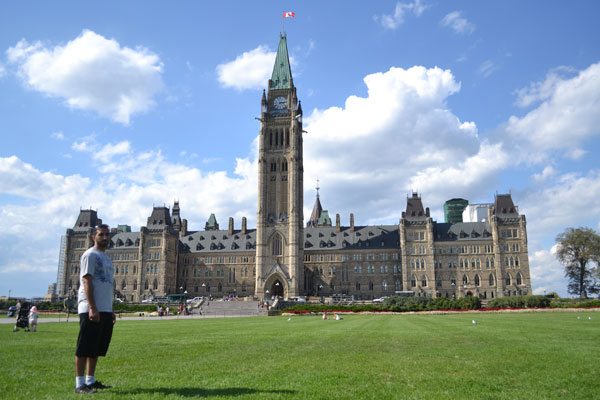While Deepan Budlakoti’s struggle for citizenship is the first of its kind in Canadian history, his current predicament is emblematic of the topics dominating today’s political discourse
After a day of talking over the phone, I finally met Deepan Budlakoti in person on Parliament Hill.
The location was chosen partly because of its geographical convenience—there were more parking spaces available downtown compared to the University of Ottawa campus during frosh week—but our meet up spot is symbolically significant as well.
For the last five years Budlakoti has been fighting to regain his Canadian citizenship, something that the government stripped away from him in 2010. To make matters worse, he is also at risk of being deported to India, despite the fact that he’s never been to India and their government doesn’t recognize him as a citizen either.
With this in mind, I sat down on the steps of Parliament, in the shadow of the Peace Tower, and listened to this “stateless” man tell his story, anticipating a tale of an unusual bureaucratic fuck-up that has left him in a state of legal limbo.
And while Budlakoti’s story certainly lived up to that quality, I found out that it’s much bigger in its implications—because it acts as a microcosm of our government’s changing attitudes towards citizenship status, criminal rehabilitation, and humanitarian aid.
Falling through the cracks
Deepan Budlakoti was born in Ottawa on Oct. 17, 1989, but his parents’ employment history is really where this confusing saga begins.
As Indian immigrants who arrived in Canada in 1985, they worked as household staff for the Ambassador of India leading up to their son’s birth. While federal law automatically grants citizenship to those who are born on Canadian soil, the same doesn’t apply to diplomatic staff or their children.
However, since Budlakoti’s parents claim to have stopped working for the embassy months before their son’s birth, they felt that this stipulation was a non-issue.
As such, Budlakoti never felt the need to question the status of his citizenship growing up, since he always considered himself to be a Canadian.
“I was born and raised here, I got a Canadian birth certificate, I was going to school and everything,” he said. “I even got a Canadian passport (in 2003).”
The validity of Budlakoti’s nationality was never called into question until May of 2010, when he was serving time behind bars on a breaking and entering charge. Once Budlakoti was “in the system”, this drew the attention of the Canadian Border Service Agency, who noticed some irregularities in his parents’ history. An officer involved in his case came to him and told him he’s not a Canadian citizen, said Budlakoti.
“I told him that of course I’m a citizen. I was born and raised in Canada. I showed him a copy of my birth certificate and a copy of my passport,” he said.
Those two pieces of identification were rendered null and void two weeks later.
Ever since then, Budlakoti has appealed to every high-level judicial body in the country to get this decision overruled, including the Ontario Superior Court of Justice and the Supreme Court of Canada.
However, waiting for these appeals to come through hasn’t been easy, since his access to housing, health care, and employment opportunities is severely limited without citizenship.
“It’s very hard to get a job based on the fact that my case is so well known in Ottawa,” he said, revealing that he works odd construction jobs and paid speaking gigs to get by. “So when an employer finds out ‘Oh wait, aren’t you that guy that’s dealing with his citizenship? Oh, we don’t want any problems here’.”
Budlakoti’s supporters—including the University of Ottawa’s branch of the Ontario Public Interest Research Group (OPIRG)—have criticized the government for their handling of this case, and feel that the idea of deporting someone due to bureaucratic discrepancies is completely lacking in compassion and common sense.
But according to some this case has nothing to do with bureaucratic rigmarole, and everything to do with politics.
I am Canadian*
Of course, Budlakoti’s campaign to prove that he is a native of Canada has come at an inopportune time, since the sitting government is currently enforcing tighter legal stipulations for Canadian citizenship.
Professor Joel Westheimer—a citizenship education expert from the U of O—explains that in the past Budlakoti’s case would have been considered a “no-brainer,” as it would have been for anyone else who has lived all of their life in this country.
“What people are disputing is the letter of the law. Was he a citizen or was he not? Were his parents employed as diplomats or were they not at the moment he was born? But it doesn’t pass the sniff test,” he said.
Most government officials only seem concerned with bureaucratic minutae instead of practical reality, according to Westheimer.
“By any common sense he was obviously a Canadian citizen and had he not been his parents would have applied for citizenship.”
Unfortunately, complex cases of this nature have to contend with new legislation like the Strengthening Canadian Citizenship Act, also known as Bill C-24.
Under this new law, the stipulations for citizenship have been escalated, including a longer required physical presence in Canada and increased security measures.
However, the most contested part of Bill C-24 has to do with the fact that it gives government officials more avenues to revoke people’s citizenship. For example, the majority of the revocation cases are now handled by the Minister of Citizenship and Immigration, as opposed to a federal court judge.
“This idea of stripping citizenship from people is a fairly new one,” remarks Westheimer. “It’s a post-9/11 phenomenon (that) trickles down from 9/11 into all kinds of civilized society, like Bill C-51.”
Certain groups, including the British Columbia-based Civil Liberties Association, are worried that these increased powers puts dual citizens—and people like Budlakoti who don’t fit into the “traditional” mold—at risk, and creates a two-tiered system that categorizes certain Canadians as second-class citizens.
What’s more, others are worried that this new law even has the potential to make our universities less attractive to international students, since no-one wants to buckle down and study with the looming threat of deportation hanging over their heads.
These concerns are shared by Budlakoti, who believes that he and others in similar situations are test cases to help the government appraise the resilience of this new nation-wide standard.
“I think the Conservative government is trying to essentially bully me and make me an example. All these policies they’re putting in, it essentially has a sense of racism all across the board. Bill C-24, Bill C-51, all these bills are what? To target people that have migrated to Canada.”
Crime and punishment
But since this is an election year, the political parallels don’t stop there.
This dynamic hasn’t been lost on Westheimer, who believes that it’s no coincidence that Budlakoti’s case coincides with another hot button issue.
“I think it is political,” he said. “It’s a ‘tough on crime’ stance which will appeal to some voters.”
Indeed, Budlakoti’s criminal past—which includes breaking and entering, drug dealing, and the illegal transfer of a hunting rifle—is a major sticking point for many of his critics.
In a National Post article, Alexis Pavlich—a spokesperson for the Minister of Citizenship and Immigration—said, “This convicted criminal has never been a Canadian citizen. He should not have chosen a life of crime if he did not want to be deported from Canada.”
The Minister’s office did not respond to our calls for further comment.
While this hard-line stance perfectly falls in line with the Conservative government’s trademark tough-on-crime policies, Westheimer points out that this attitude should not apply to someone with Budlakoti’s history.
“We can talk about (deportation) with regards to people who are going overseas to plan terrorist acts,” he said, referring to new amendments that were made to the Citizenship Act thanks to Bill C-24. “But, my God…he’s a petty criminal and he’s had trouble growing up.”
Sukanya Pillay—the Executive Director and General Counsel for the Canadian Civil Liberties Association—similarly believes that the government’s proposed punishment for Budlakoti is disproportionate to his past misdeeds.
“Deepan has committed crimes, but he’s also paid his debt to society. To try and banish him for these crimes is medieval punishment that has no place in a modern, free, and democratic Canada.”
While Budlakoti says he reformed during his years in prison, and is looking to put his troubled youth behind him now that he is no longer incarcerated, he’s worried that his case sets a dangerous precedent for aspiring Canadians.
Stateless at home and abroad
The one wrinkle in this case that government officials are not so keen about highlighting is India’s reluctance to accept Budlakoti as a citizen, which effectively renders him stateless.
Not only does this make the whole scenario much more complicated for everyone involved, but it also draws attention towards Canada’s international humanitarian obligations.
“There’s the treaty that Canada has signed about the reduction of statelessness,” said Westheimer, referring to the United Nations’ official Convention on the Reduction of Statelessness. “I don’t think India is a signator to that treaty, but Canada is, which gives us even more obligations to (help Budlakoti).”
Outside of being a violation of international law, Pillay remarks that the government’s failure to provide a home-grown stateless person with protection echoes their treatment of thousands of Syrian refugees fleeing their countries civil war.
Similar to Budlakoti’s case, Canada’s response to the thousands of fleeing asylum seekers has been criticized for being hampered by impractical government planning and bureaucratic red tape.
“Traditionally, Canada has extended its arms to refugees,” said Pillay, echoing historical events such as Canada’s resettlement of thousands of South-East Asians who fled following the Vietnam War.
“But in recent years we have made amendments to the Immigration and Refugee Protection Act that fails to fulfill our obligations to refugees.”
Budlakoti reciprocates this feeling of disappointment, saying these recent developments don’t live up to his conception of Canada growing up.
“Canada is supposed to be the most humane country in the world, and welcoming to immigrants and so forth, right? But yet we have this Conservative government that’s destroying that policy completely. We lost a seat in the UN. Deportations have increased tremendously. Longer detentions have even commenced (for refugees).”
The waiting game
Ironically, while Canada’s current reputation in the international community might be taking a dive, it might be Budlakoti’s salvation.
In April the Canadian government finally submitted its findings on Budlakoti’s case to the United Nations for review, with its decision set to be revealed at an unspecified date.
Since virtually all of his various applications are currently in a process of review, the only thing Budlakoti can do is wait and hope for the best.
Combined with the fact that no opposing political party is going to touch this volatile topic in the lead up to election day, Budlakoti is left in a state of limbo that no Canadian has likely experienced before.
After some nostalgic small talk about Spider-Man toy web shooters, I bid goodbye to him near the Centennial Flame, feeling exhausted.
Up until that day, I had never considered what my own Canada citizenship really meant, and the idea that it could intersect with so many complex political issues made we want to lie down.
Maybe I had taken it for granted? Heck, maybe we all do?
But I do know one thing for sure—the one person in the country who doesn’t take the issue of citizenship lightly is Deepan Budlakoti.





